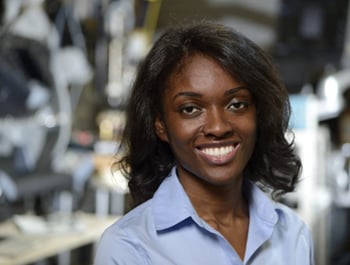Modern surgery is not without its risks. In order to perform ever complex surgical procedures, surgeons must lean on their expertise in anatomy and their past surgical experience. The slightest error in judgment could result in the patient experiencing a critical injury, paralysis, or even death. The use of photoacoustic imaging systems has already demonstrated the potential to aid surgeons in more effectively differentiating between tissue that is diseased and tissue that is healthy.
Electrical and Computer Engineering Assistant Professor and PULSE Lab Director, Muyinatu Bell, aims to significantly improve photoacoustic imaging by developing tools that will unconventionally separate light from acoustic receivers and deliver the light directly to the surgical site. Through her research, she also aims to create a knowledge base of tissue-specific safety limits for light being delivered directly to the tissue without causing tissue damage. This research will be funded by the National Science Foundation’s Faculty Early Career Development Program (CAREER), which Professor Bell was recently awarded.
The CAREER award aims to support faculty who are still early in their career and demonstrate the potential to serve as academic role models as they provide momentum of their organization’s mission. Bell’s project, entitled Technical & Theoretical Foundations for Photoacoustic-Guided Surgery, has three aims: to determine the limits of light delivery to bone, heart, and brain tissues; to refine novel acoustic beamformers and signal processing methods; and lastly, to create a new resolution model that will predict the accuracy limits of integrated robotic-photoacoustic imaging systems.
The information gathered from this research has the potential to greatly reduce injuries and complications resulting from surgery. Bell plans to share the research results with the scientific community, as well as the general public through the video series, The Scholar Next Door. As an African American woman professor, Bell hopes to use this research in her continued efforts of outreach to underrepresented communities in STEM and the K-12 population, with the aid of the JHU Center for Educational Outreach (CEO) and in her role as faculty advisor to the Graduate Association [of women] in CS & ECE (GRACE).
